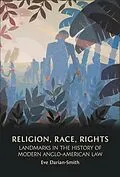The book highlights the interconnections between three framing concepts in the development of modern western law: religion, race, and rights. The author challenges the assumption that law is an objective, rational and secular enterprise by showing that the rule of law is historically grounded and linked to the particularities of Christian morality, the forces of capitalism dependent upon exploitation of minorities, and specific conceptions of individualism that surfaced with the Reformation in the sixteenth century and rapidly developed in the Enlightenment in the seventeenth and eighteenth centuries. Drawing upon landmark legal decisions and historical events, the book emphasises that justice is not blind because our concept of justice changes over time and is linked to economic power, social values, and moral sensibilities that are neither universal nor apolitical. Highlighting the historical interconnections between religion, race and rights aids our understanding of contemporary socio-legal issues. In the twenty-first century, the economic might of the USA and the west often leads to a myopic vision of law and a belief in its universal application. This ignores the cultural specificity of western legal concepts, and prevents us from appreciating that, analogous to previous colonial periods, in a global political economy Anglo-American law is not always transportable, transferable, or translatable across political landscapes and religious communities.
Autorentext
Eve Darian-Smith is Professor of Global & International Studies at the University of California Santa Barbara, USA, and the author of Bridging Divides: The Channel Tunnel and English Legal Identity in the New Europe (Winner of the Law and Society Association Herbert Jacob Book Prize).
Inhalt
Introduction: Connecting Religion, Race and Rights
I: Moving toward Separation of Church and State
Chapter 1: Martin Luther and the Challenge to the Catholic Church (1517)
Religion: Protest and Reform
Race: The Infidel Turk
Rights: Demanding Secular Law
Conclusion
Chapter 2: Executing the King: The Trial of Charles I (1649)
Religion: Protestant and Catholic Violence
Race: Religious Intolerance and Legalizing Racism
Rights: Defining the Rights of King, Parliament and Subject
Conclusion
Chapter 3: Revolution and Thomas Paine's Rights of Man (1791)
Religion: The Age of Reason and the Challenge of Science
Race: Questioning Slavery and Discrimination
Rights: Law's Coming of Age in Rights of Man
Conclusion
II: Capitalism, Colonialism and Nationalism
Chapter 4: Sugar, Slaves, Rebellion, Murder (1865)
Religion: The 'Divine Institution' of Slavery
Race: Scientific Racism
Rights: Empire's Right to Massacre
Conclusion
Chapter 5: Demanding the Eight-Hour Workday (1886)
Religion: Law as Faith
Race: Racializing Labor 161
Rights: Workers versus Laissez-Faire Capitalism
Conclusion
Chapter 6: Civilizing Native Americans-The Dawes Act (1887)
Religion: Missionaries and Heathens
Race: Determining the Race Within
Rights: Limiting Native Sovereignty
Conclusion
III: Religion, Race and Rights in a Global Era
Chapter 7: Nuremberg's Legacy (1945-49)
Religion: Confronting Religious Pluralism
Race: Rethinking Race
Rights: Implementing Human Rights
Conclusion
Chapter 8: Democracy, Neoliberalism, and the New Crusades
Religion: Exploiting God
Race: 'Saving Brown Women'
Rights: The Challenges of Neoliberalism
Conclusion
Conclusion: The Resurgence of Faith
